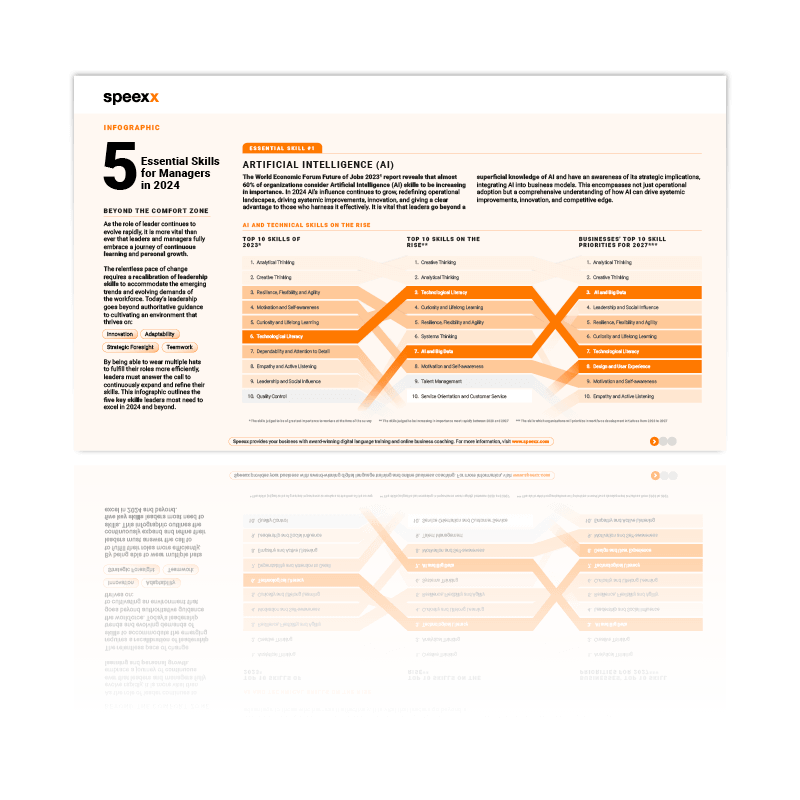Leadership is a crucial aspect of personal and professional growth, but it can often be challenging, especially for more introverted professionals. Bill Gates, Warren Buffett, Eleanor Roosevelt, Rosa Parks, Mahatma Gandhi, Marissa Mayer, Mark Zuckerberg… All of them are renowned introverted leaders who have reached the top in their respective fields. With so many examples of these “quiet leaders,” the question arises: why wouldn’t an introverted person be able to lead teams effectively?
Introversion Is Not Shyness
Introversion is often confused with shyness, but it is important to understand that they are different concepts. Introversion refers to a person’s tendency to recharge their batteries through solitude and introspection, while shyness is the fear of social situations.
Here are a few practical tips for introverts who aspire to become leaders and want to make the most of their potential. The goal of this post is to help introverted professionals understand their strengths and weaknesses and develop the skills necessary to succeed as leaders. By embracing their individuality and leveraging their unique traits, introverts can lead just as effectively and enjoy the process.
Introvert vs. Extrovert – Who Makes a Better Leader?
In 2022, a study published in the Journal of Applied Psychology questioned whether introverts are at a disadvantage compared to extroverts when it comes to being seen as leaders.
The study showed that communication, not extroversion, is the most important factor for leadership. The researchers divided more than 400 college students into groups and assessed their leadership potential based on their communication skills during a group decision-making activity. The results showed that introverts and extroverts had similar communication skills in the group setting, and that communication was the key factor driving perceptions of their leadership potential. The study’s authors emphasize that the results refer to who is perceived as a leader, not who is an effective leader.
“This is important because communication skills can be learned, which means that anyone can develop their communication skills to increase their chances of being a leader,” says James Lemoine, associate professor of organization and human resources at the University at Buffalo School of Management and co-author of the study.
As stated in an article in Harvard Business School, both types of leaders, extroverts and introverts, can be equally successful or unsuccessful, but with different groups of employees. Research by HBS associate professor Francesca Gino highlights the importance of having introverted leaders.
However, introverts are known to have difficulty advancing in their careers and reaching leadership positions, especially in environments where they work with more extroverted colleagues who tend to get promoted and fit the conventional leadership stereotype. According to a 2009 study, 98% of professionals in executive positions were extroverts. However, when we examine employee satisfaction with their leaders, the figures can be worrying.
Understanding the Characteristics of Introverted Leaders
Introverts often have characteristics that, when applied in the workplace, are real strategic advantages. A recent article in Forbes, “The Quiet, Transformative Power of Introverted Leaders,” highlights certain soft skills as strengths of introverted leaders. Understanding the key traits of introverted leaders can help them leverage their strengths and develop strategies to overcome their weaknesses.
Some Common Traits of Introverted Leaders:
- Introspection: Introspection is a valuable tool for self-awareness, which is essential for understanding one’s own thoughts and feelings, although it should be complemented by other forms of analysis or external feedback to gain a more complete understanding of oneself.
- Active listening skills: Introverted leaders are excellent listeners, which allows them to understand their team’s perspectives and increase trust within the team.
- Thoughtful decision-making: Introverted leaders tend to be thoughtful and cautious in their approach, which helps them make well-informed decisions and avoid rash or impulsive actions, often resulting in more effective strategies in the long run.
- Empathy: The key to understanding and responding to the needs of the team, fostering stronger relationships among colleagues where communication and respect flow freely.
- Autonomy: Introverted leaders tend to be independent and prefer to work alone, which allows them to focus on their work and achieve their goals.
While these traits can be strengths, they can also be weaknesses if not managed properly. For example, because of their level of autonomy and independence, they may find it difficult to network and build relationships, which can affect their ability to lead effectively. It is essential that introverted leaders understand their strengths and weaknesses and develop strategies to overcome the challenges they face. This will allow them to be confident in their leadership abilities and effectively lead their team.
Leadership Skills Development for Introverts
Introverts can benefit from leadership training to maximize their potential. Here are some strategies to help them develop their skills:
Improve communication skills: All leaders, including introverts, can have communication issues, especially in large groups or high-pressure situations. Improving communication skills, such as public speaking and active listening, can help introverts communicate more effectively and build stronger relationships with their team.
Networking strategies: Networking can be challenging for introverts, but it is essential for building relationships and getting ahead. These quieter leaders can benefit from developing networking strategies that play to their strengths, such as attending smaller events or reaching out to people one-on-one.
Improving self-confidence: Confidence is crucial for effective leadership, and all leaders can struggle with self-doubt or impostor syndrome. Building confidence can be achieved by developing a growth mindset, setting achievable goals, and adopting a positive attitude.
Authenticity: Introverted leaders can benefit from embracing their authenticity in their leadership style. This means being true to themselves and not trying to fit into society’s expectations of a leader. By leveraging their personal traits, introverted leaders can bring a fresh perspective and new ideas to their team.
It is important for introverted leaders to understand that their strengths are just as valuable as those of more extroverted leaders. By accepting their individuality and developing their leadership skills, introverted leaders can lead with confidence and impact.
Developing Leadership Skills for Introverts
Introverted leaders can benefit from developing their leadership skills in order to maximize their potential. Here are some strategies for developing leadership skills for introverts:
Improving Communication Skills: All leaders, including introverts, may struggle with communication, especially in large groups or high-pressure situations. Improving communication skills, such as public speaking and active listening, can help introverts communicate more effectively and build stronger relationships with their team.
Networking Strategies: Networking can be challenging for introverts, but it is essential for building relationships and advancing in their careers. Introverted leaders can benefit from developing strategies for networking that play to their strengths, such as attending smaller events or reaching out to individuals one-on-one.
Building Confidence: Confidence is crucial for effective leadership, and all leaders may struggle with self-doubt or impostor syndrome. Building confidence can be achieved through developing a growth mindset, setting achievable goals, and embracing a positive attitude.
Embracing Authenticity: Introverted leaders can benefit from embracing their authenticity in their leadership style. This means being true to themselves and not trying to conform to society’s expectations of a leader. By embracing their unique traits, introverted leaders can bring a fresh perspective and new ideas to their team.
It’s important for these leaders to understand that their strengths are just as valuable as those of extroverted leaders. By embracing their individuality and developing their leadership skills, introverted leaders can lead with confidence and impact.

Find out the 5 most crucial leadership skills
Overcoming the Challenges Faced by Introverted Leaders
Being a leader can be challenging for anyone, and introverted leaders face specific challenges that can affect their ability to lead effectively.
Strategies for overcoming the challenges faced by introverted leaders:
Dealing with different work dynamics: Introverted leaders may struggle with workplace dynamics, such as working in extroverted teams, feeling overwhelmed by large groups and meetings, or leading in a changing environment. To overcome these challenges, introverts can develop strategies to better communicate their ideas, seek support from mentors and colleagues, and find ways to recharge after social interactions.
Balancing work and personal life: Introverted leaders may struggle to balance their personal and professional lives, especially if they work in high-pressure environments. To overcome this challenge, introverts can set boundaries, prioritize self-care, and seek support from friends and family.
Coaching and mentoring to curb burnout: Introverted leaders can benefit from the help of coaches, mentors, and colleagues who understand their unique challenges and can provide guidance and encouragement. Building a network of like-minded individuals can provide introverted leaders with a supportive community, professional development opportunities, and a sounding board for their ideas.
In a professional environment that can overwhelm anyone, especially leaders, business coaching has emerged as a holistic solution to today’s professional challenges. Speexx offers a wide range of personal development programs, including goal setting, confidence building, and self-care, as well as communication skills development.
How Digital Business Coaching Can Help Introverts Shine as Leaders
In today’s fast-paced, digital world, introverted leaders can benefit from digital business coaching solutions that help them shine as leaders. One such solution is Speexx, which provides personalized coaching and support to leaders seeking to improve their skills and reach their potential. At Speexx, we offer a range of coaching services designed specifically for introverted leaders, including:
Communication skills training: Introverted leaders can benefit from communication skills training to help them communicate effectively with their team and build stronger relationships.
Personal development: Personal development is an important path for all leaders, including introverts.
Mentors and networking: Introverted leaders can benefit from mentoring and networking opportunities to find support and build relationships with other professionals. At Speexx, we offer mentoring programs and organize networking events to help introverted leaders connect with others and build their professional network.

Discover the Power of Business Coaching
Embrace the Power of Introversion
Introverts can be successful leaders and have a positive impact on their team if they embrace their individuality and develop their leadership skills. By understanding the characteristics of this type of leader, as well as strategies for developing their skills, they can overcome the challenges they face and lead with confidence.
Introverts bring unique perspectives to the table, thanks to their introspection, strong listening skills, and ability to make informed decisions. By leveraging these strengths and developing their leadership skills, even less extroverted leaders can achieve their goals and lead their teams to success.
Remember that leadership is not about conforming to society’s expectations or trying to be someone you’re not. It’s about being true to yourself and leveraging your unique traits to make a positive impact. So, embrace your individuality, develop your leadership skills, and lead with confidence!




